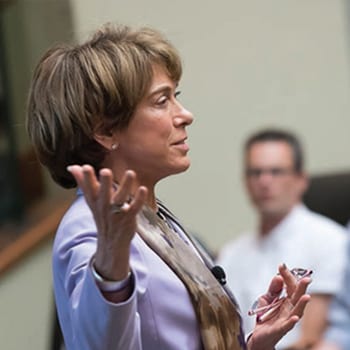When the coronavirus pandemic hit, Berkeley Haas Assoc. Prof. Adair Morse and Prof. Laura Tyson immediately began thinking about ways to make it possible for cities to attract private and institutional capital to help small businesses make it through the crisis.
Their idea has now taken root locally, with a new partnership between Berkeley Haas and the City of Berkeley’s Mayor Jesse Arreguín and Vice Mayor Sophie Hahn to pool private and public money into a small business loan fund.
Last week, the Berkeley City Council approved creation of the Save our Small (SOS) Business Recovery Loan Fund, to support businesses with fewer than 50 employees that have already felt the severe impact of the economic shutdown to slow the spread of the coronavirus.
The news comes as the $349 billion federal government program meant to keep small businesses afloat during the pandemic ran out of money last Thursday, just two weeks in.
Small business loan and grant programs by the federal, state, and local governments have been keeping the lights on, but when shelter-in-place ends, small businesses need working capital to restock, pay employees, and catch up on credit and rent, said Morse, who proposed the loan program to the Berkeley Mayor’s office with Tyson, Distinguished Professor of the Graduate School.

Both are founders of The Sustainable and Impact Finance (SAIF) initiative at Berkeley Haas, a program founded last year to use impact investing and sustainable finance to drive positive change and opportunities. Helping Berkeley’s small business community to rebound is perfectly aligned with SAIF’s mission, Morse said.
“Many municipal programs are already helping small businesses to keep the lights on, but in the medium term, small business survival will require more capital,” Morse said.
One key SOS loan fund supporter is Kirsten MacDonald, CEO of the Berkeley Chamber of Commerce, who says about 98% of local businesses are considered small businesses.
There’s a lot at stake with the recovery and a lot of anxiety coming from local business owners ranging from hairdressers to small nurseries and retailers, she said. “I don’t think anybody knows what the aftermath of this is going to be like (for business),” said MacDonald, who wrote a statement of support to the city for the SOS Fund. “The city should be looking at any and all ways to provide financing at a low rate to small businesses,” she said.
Many municipal programs are already helping small businesses to keep the lights on, but in the medium term, small business survival will require more capital.
More federal and state money may come, but the goal of the SOS fund is to support businesses that were healthy and viable before the pandemic and help them weather the crisis. “It’s imperative to support viable, forward-looking businesses that can, in turn, support our economy through owner successes, employee wages, and return on property,” Morse said.
Mayor Arreguín called the program “a creative way for the city, campus, and community to come together to support one of Berkeley’s most important resources, our small businesses, in this time of unprecedented need.”

“We want all ideas and support on the table for our business community,” he said.
While the City of Berkeley will manage the program’s loans, Morse and Tyson are working with the SAIF team to design the loan terms and to build the model used to make the loan decisions.
“This program is so well-structured,” said Ben Mangan, executive director of the Center for Social Sector Leadership at Haas, who will help the SAIF team with outreach in the investing community. “Once we have a few leaders who take the plunge and invest I think we’ll see a quick uptick in participation.”
The Berkeley Mayor’s office is looking for a financial institution to partner with on distributing the five-year loans. The financial institution will offer private investors a fixed-income product, something like a WWI Liberty Bond for COVID-19, that will yield a 1% to 2% return, Morse says. The rest of the funding to back the loans will be provided by local government and philanthropy.
While the City of Berkeley will market and manage the fund, Morse said Haas will help get the word out to private wealth and asset managers through its network.
“We hope to have this done and ready when businesses are allowed to open again,” Morse said. She added that she hopes the fund will become a model for other communities.